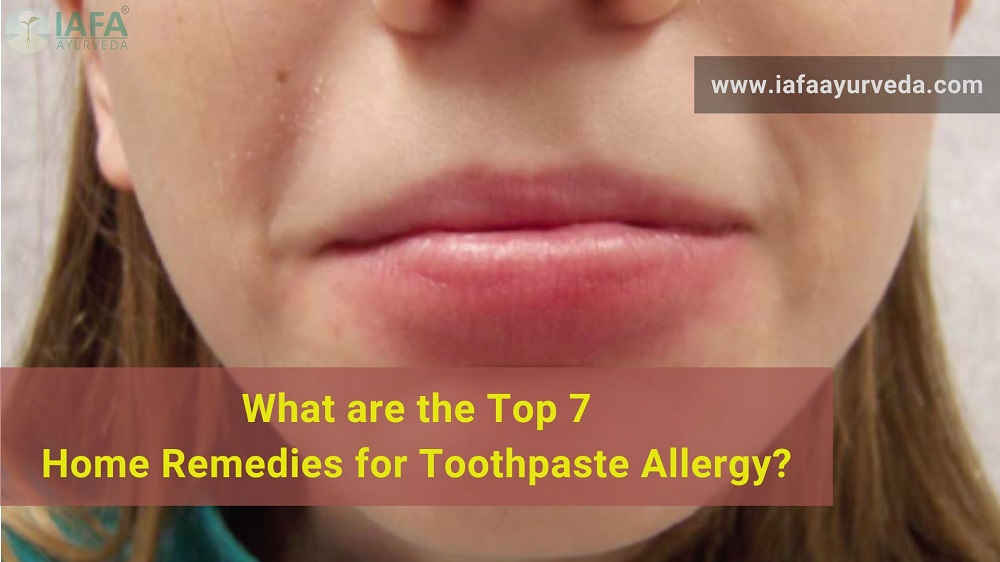Allergies to toothpaste are uncommon, but they do occur. An allergy to toothpaste causes itching, ulcers, and peeling inside the mouth and around the lips, and is a type of contact dermatitis.
An allergic reaction is most likely to be caused by toothpaste flavorings, such as mint, however other components may also play a role.
Chapped lips, rash around the mouth, and an uncomfortable or burning sensation are all symptoms of allergies.
Allergens or components in it may be the most common reason for allergies. Treating such conditions or the underlying cause will aid in the speedier healing of allergies. There is no better treatment than home remedies for toothpaste allergy.
Symptoms of Toothpaste Allergy
- Itching of the lips
- Mouth sores
- Tongue irritation
- Swollen gums
- Itching or burning sensation around the mouth
A recurring symptom of toothpaste allergy is severely chapped dry lips. Cheilitis is the medical term for this condition.
Causes of Toothpaste Allergy
Toothpaste could contain a variety of allergies. Fluoride, flavorings, perfumes, dairy, and gluten are among them. Cinnamon compounds were a prominent source of toothpaste allergies. Cinnamic aldehyde, a common flavoring component in mouthwash, lip sunscreen, and toothpaste, was found to play a role in the development of the allergy.
Ayurvedic Treatment of Toothpaste Allergy
According to Ayurveda, infection is caused by an imbalance in the three doshas of Vata, pitta, and Kapha. Dental disorders are caused by Kapha dosha imbalances.
Dental disorders such as yellow teeth, foul breath, bleeding gums, loosening of teeth, dental decay, and pain can all be treated with Ayurveda. For dental disorders, Ayurveda prescribes a variety of medicines and dietary changes, including turmeric, babul, neem, banyan, clove, and holy basil. Soft drinks and sugar should all be avoided. Consume plenty of raw veggies, citrus fruits, and leafy greens.
Home Remedies for Toothpaste Allergy
1. Clove oil
Clove oil has strong germicidal capabilities due to the presence of the bioactive element Eugenol. This oil is an effective treatment for toothpaste allergy controlling its symptoms of bleeding gums, toothaches, gingivitis, mouth ulcers, and sore gums, among other things. It also helps to prevent bad breath due to its fragrant characteristics.
2. Coconut Oil
Coconut oil is utilized for an assortment of purposes. When it comes to toothpaste allergy symptoms, and mouth ulcers, however, few people are familiar with its restorative benefits. coconut oil has antibacterial qualities that aid in naturally reducing pain. The oil can help to relieve the pain associated with allergy. Simply apply a small amount of coconut oil to the affected surface and leave it. It can also be used before going to bed at night.
3. Ginger
Ginger has anti-inflammatory effects and is high in antioxidants, which help to minimize gum swelling.
To make a paste, grind and mash the ginger and add the salt. Apply this mixture to your inflamed gums and keep it on for 10-12 minutes. Then rinse it with tap water. Do this a couple of times a day.
4. Neem
The antimicrobial effects of neem oil are well-known. Neem is well-known for battling viral and bacterial infections, gum and tooth decay, and free radical damage in the mouth. You can use different ways to utilize neem for optimal oral health including chewing on dried neem twigs, drinking neem churan, and drinking neem-infused water. Brushing your teeth with neem twigs can help prevent gum disease and ease the symptoms of toothpaste allergy. Neem twigs are readily available in medical supply stores.
5. Babul Tree Bark
This is a tried-and-true method for treating inflamed gums. To keep your teeth clean and healthy, Ayurveda recommends chewing the Babul (or babool) bark. This is due to the presence of antibacterial chemicals in babul bark, which can fight common bacteria found in our mouths. This medication will help you get rid of the inflammation caused by swollen gums and is very helpful with allergies. Simmer the tree bark for 5-7 minutes in water. This can be used as a mouthwash.
6. Aloe Vera Gel
Anti-inflammatory, Antibacterial, and antioxidant activities are found in the gel of this miracle plant. It reduces gum swelling and soreness while also killing hazardous germs which help in relieving allergy symptoms.
Apply the gel to the gums. rinse your mouth after leaving it on for as long as possible. You can also gargle with the gel to effectively relieve inflamed gums.
7. Triphala
Triphala is a combination of three key ayurvedic herbs: Amalaki, Haritaki, and Bibhitaki, each with its own set of therapeutic characteristics. The antibacterial and astringent qualities of this herbal powder or juice, on the other hand, are widely used to treat a variety of gum ailments, including bleeding gums, rashes on the mouth, and itching in the lips.
Gargle with a tablespoon of Triphala powder in warm water 3-4 times a day to prevent bleeding gums and other dental issues.
Conclusion
Consult an Ayurvedic Expert before utilizing any of these remedies. Contact us to book a consultation from Dr. Gupta at IAFA®, he managed all allergies including toothpaste allergies very efficiently by using natural and potent herbs.




